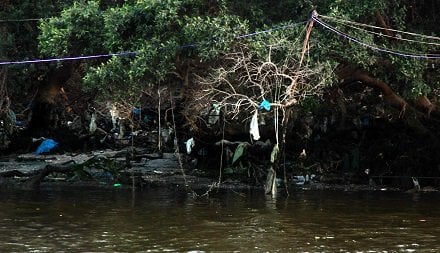
This was stated by experts during an event held to mark World Earth Day, which will be held on Sunday, organised on Friday by the World Wildlife Fund (WWF) - Pakistan in collaboration with Karachi University (KU) at the Institute of Environmental Sciences under the sustainable fisheries entrepreneurship project supported by the Engro Foundation.
Experts shared that plastic products take hundreds of years to decompose as they have strong chemical bonds that make them last longer. The simplest plastic normally used in grocery store bags take at least 100 years to break down, while the complex ones take between 100 and 600 years or can last even beyond that. During this period, these plastic products keep damaging the environment until they are completely decomposed.
Mangroves planted to mark Earth Day
Close to 48 years ago, in April, 1970, millions of people took to the streets to protest against the negative impacts of 150 years of industrial development and since then it has become a regular feature to celebrate World Earth Day on April 22 to address environmental issues.
The event shed light on threats emerging from plastic pollution and suggested practical solutions to mitigate the issue. It mobilised participants, especially students, to develop innovative ways to help end plastic pollution in Pakistan.
The theme for this year's World Earth Day is 'End Plastic Pollution', which is aligned with WWF-Pakistan's upcoming campaign to curb the use of single-use plastics.
KU Faculty of Sciences Dean Tasneem Adam Ali said that using an excessive amount of single-use plastics in our daily lives is devastating the environment. In Pakistan, plastic is becoming an environmental catastrophe in both the rural and urban areas, Ali said, adding that plastic bags choke drains, which results in flooding.
She emphasised the promotion of the 4R concept, which is to reject, reduce, reuse and recycle plastic products.
"The theme for Earth Day this year stresses that every individual, policymaker and business must take action against plastic pollution in order to protect our ecosystems," she added.
On World Health Day 2017, WHO urges you to talk about depression
Studies carried out by WWF-Pakistan indicate that the number of incidents of marine animals trapped in plastic products in the sea is increasing. It is estimated that globally, around eight million tons of plastic is deliberately dumped in the sea or finds its way there through the wind or river flow and urban runoff. This is approximately equivalent to the dumping of a garbage truck into marine waters every minute.
WWF-Pakistan Technical Adviser for Marine Fisheries Muhammad Moazzam Khan shared that plastic products, mainly in the form of household utensils and low quality toys, have been used in Pakistan even prior to its creation in 1947.
However, from 1965 to 1975 there was a noticeable increase in the use of plastic when it became an integral part of our lives, he said, adding that today, plastic material constitutes the fourth largest item of import and this sector alone contributes significantly to the national exchequer in different heads.
The industry is growing at an annual average of 15 per cent and has surpassed all other industrial sectors, he said.
"Today, the domestic consumption of plastics stands at more than 2.7 kilogrammes, which is far less than the international average. Yet, Pakistan is the second largest domestic market in the Southeast Asia after India," Khan said.
The issue of plastic pollution along Pakistan's coast is worsening due to an inadequate solid waste disposal system in the city, KU Institute of Environmental Science Director Professor Omme Hany said.
WWF-Pakistan Sindh Manager Conservation Altaf Hussain Sheikh said that urbanisation has increased demand of plastic products and since these products are much cheaper and affordable compared to metal, wood and ceramic, its use is increasing day by day.
The event was attended by more than 100 participants, particularly faculty members, students and media representatives. A solid waste collection activity took place by students and volunteers to change behaviour towards plastics and educate the general public about the issue.




1730959638-0/trump-(19)1730959638-0-165x106.webp)












COMMENTS
Comments are moderated and generally will be posted if they are on-topic and not abusive.
For more information, please see our Comments FAQ